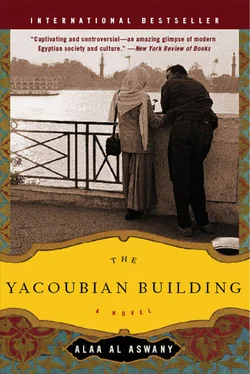Alaa Al Aswany - The Yacoubian Building
Здесь есть возможность читать онлайн «Alaa Al Aswany - The Yacoubian Building» весь текст электронной книги совершенно бесплатно (целиком полную версию без сокращений). В некоторых случаях можно слушать аудио, скачать через торрент в формате fb2 и присутствует краткое содержание. Год выпуска: 2006, ISBN: 2006, Издательство: Adobe Acrobat eBook Reader, Жанр: Современная проза, на английском языке. Описание произведения, (предисловие) а так же отзывы посетителей доступны на портале библиотеки ЛибКат.
- Название:The Yacoubian Building
- Автор:
- Издательство:Adobe Acrobat eBook Reader
- Жанр:
- Год:2006
- ISBN:978-0-06-087813-9
- Рейтинг книги:5 / 5. Голосов: 1
-
Избранное:Добавить в избранное
- Отзывы:
-
Ваша оценка:
- 100
- 1
- 2
- 3
- 4
- 5
The Yacoubian Building: краткое содержание, описание и аннотация
Предлагаем к чтению аннотацию, описание, краткое содержание или предисловие (зависит от того, что написал сам автор книги «The Yacoubian Building»). Если вы не нашли необходимую информацию о книге — напишите в комментариях, мы постараемся отыскать её.
The Yacoubian Building — читать онлайн бесплатно полную книгу (весь текст) целиком
Ниже представлен текст книги, разбитый по страницам. Система сохранения места последней прочитанной страницы, позволяет с удобством читать онлайн бесплатно книгу «The Yacoubian Building», без необходимости каждый раз заново искать на чём Вы остановились. Поставьте закладку, и сможете в любой момент перейти на страницу, на которой закончили чтение.
Интервал:
Закладка:
When she had calmed down a little, she asked herself why she cared that much about her pregnancy. She was of course religious, and abortion was a sin, and she was also terrified of the operation itself because many women died during it. All these were genuine considerations, but they were secondary. A deep-seated, instinctive desire drove her to fight ferociously in defense of her pregnancy. She felt as though if she bore the child, she would recover her self-respect. Her life would acquire a new and decent meaning. She would no longer be the poor woman whom the millionaire Azzam had purchased to enjoy himself with for a couple of hours in the afternoon but a real wife who could not be ignored or slighted. She would be the child’s mother, going in and out with the Hagg’s son in her arms. Wasn’t that her right?
She had gone hungry, begged, and tasted humiliation, and a hundred times refused to go astray, and in the end she had given her body to a man as old as her father, had put up with his dullness, his gloominess, his wrinkled face, his dyed hair, and his flagging manhood, had pretended that she was fulfilled and that her body was aching with desire, just for him to come to her and go away again in secret, as though she were a mistress; she had done all this only to sleep on her own in a cold bed and a huge, frightening apartment where she was forced every night to turn on the lights in order to dispel the lonesomeness and every day to weep out of yearning for her son; and then, when Azzam’s appointed time came, to do herself up for him and play out the role for which she had been paid. Wasn’t it her right after all that humiliation to feel that she was a wife and a mother? Wasn’t it her right to bear a legitimate son who would inherit the wealth that would protect her from the horrors of poverty forever? God had granted her this pregnancy as a just reward for her long patience and she wouldn’t give it up at any price.
Such were Souad’s thoughts. Then she went into the bathroom and took off her clothes, and as soon as the hot water gushed over her naked body, a strange and new feeling came over her that her body, which Azzam had used and defiled and abused for so long, had suddenly been liberated and become her property alone. Her hands, her arms, her legs, and her breasts — every part of her body — breathed freely and she could feel a beautiful light pulse beating inside her, a pulse that would get bigger and grow and fill her day after day until the time came and it emerged as a beautiful child that would look like her, would inherit its father’s wealth, and would restore her self-respect and her proper station. She finished her shower, dried herself, and put on her night things. Then she performed the evening prayer and the additional extra prostrations and sat in bed reading the Qur’an until drowsiness overcame her.

“Who’s there?”
She woke from sleep at the sound of movement and muttering outside the room. She thought that a thief had slipped into the apartment, and, quaking with terror, decided to open the window and call to the neighbors for help.
“Who’s there?”
She screamed again in a high-pitched voice and strained to hear as she sat on her bed in the dark; the sounds, however, had ceased and quiet reigned. She decided that she would investigate herself and put her feet down on the floor, but fear paralyzed her limbs. She convinced herself that it was just her imagination and got back in bed and put a pillow over her head and for a few moments tried to plunge back into sleep. Then suddenly the door of the room opened so forcefully it banged against the wall and they fell on her.
There were four or five of them. Their faces didn’t show in the dark. They pounced on her and one of them smothered her mouth with the pillow while the others grabbed her hands and feet. She tried with all her strength to slip out of their clutches and to scream at the top of her voice and she bit the hand of the man who was gagging her, but her resistance failed because they had tied her up tightly, completely paralyzing her movements. They were strong and well trained and one of them rolled up the sleeve of her pajamas and she felt something like a sharp thorn being stuck into her arm. Little by little her body began to weaken and relax. Then her eyes closed and she felt everything around her moving away and dissolving into nothing, like a dream.

The newspaper Le Caire was established in Cairo a hundred years ago in the same old building that it still occupies in Galaa Street, and since its founding it has been published every day, in French, for residents of Cairo who speak that language.
When Hatim Rasheed graduated from the Faculty of Humanities, his French mother was able to find him work on the newspaper. He proved his aptitude for journalism and was quickly promoted till he was appointed to be editor-in-chief at the age of forty-five. He introduced sweeping changes to the newspaper and added an Arabic-language section aimed at the Egyptian reader. During his time distribution rose to thirty thousand copies daily, which was a huge number in comparison to the other small local newspapers. This success came as a natural and just result of Hatim’s efficiency, his assiduity, his effective contacts with varied milieux, and his amazing capacity for work, which he had inherited from his father.
If one remembers that over seventy individuals (administrative staff, reporters, and photographers) work under his direction at the newspaper, the first question that comes to mind is, Do they know about his homosexuality? The answer, of course, is yes, because people in Egypt are interested in the personal lives of others and delve into them with persistence and focus. Homosexuality is impossible to hide and all the employees at the paper know that their boss is homosexual. Despite the revulsion and contempt this arouses, Hatim Rasheed’s perversion remains merely a distant, pale shadow to his forceful, compelling professional image. They are aware of his homosexuality but do not feel it in any way in their daily dealings with him because he is serious and stern (more perhaps than is necessary) and, while he spends most of the day with them, not the slightest movement or glance that might hint at his tendencies escapes him.
A few vulgar incidents have of course occurred during his time as head of the newspaper. Once there was a lazy and unsuccessful journalist on whom Hatim made a number of negative reports in preparation for his final removal from the newspaper. The journalist knew the chief editor’s intention so decided to get his revenge and exploit the presence of all the reporters at the weekly editorial meeting. He asked for the floor and when Hatim gave him permission, he addressed him, saying in a sarcastic tone, “I wish to propose to you, sir, the idea of an investigative piece on the phenomenon of homosexuality in Egypt.”
There was a tense silence and the writer could not conceal a smile in his eagerness to insult Hatim, who said nothing but bowed his head and stroked his smooth hair (as was his custom when surprised or nervous). Then he leaned back in his chair and said calmly, “I don’t think the subject concerns the readers.”
“On the contrary, it concerns them a great deal, because there’s been a major increase in the number of homosexuals and some of them now occupy leadership positions in the country, and scientific studies show that the homosexual is psychologically unfit to lead the work of any institution because of the psychological aberrations that homosexuality causes.”
The attack was harsh and sweeping and Hatim determined to respond with violence, so he said firmly, “Your outmoded style of thinking is one of the reasons for your failure as a journalist.”
Читать дальшеИнтервал:
Закладка:
Похожие книги на «The Yacoubian Building»
Представляем Вашему вниманию похожие книги на «The Yacoubian Building» списком для выбора. Мы отобрали схожую по названию и смыслу литературу в надежде предоставить читателям больше вариантов отыскать новые, интересные, ещё непрочитанные произведения.
Обсуждение, отзывы о книге «The Yacoubian Building» и просто собственные мнения читателей. Оставьте ваши комментарии, напишите, что Вы думаете о произведении, его смысле или главных героях. Укажите что конкретно понравилось, а что нет, и почему Вы так считаете.












